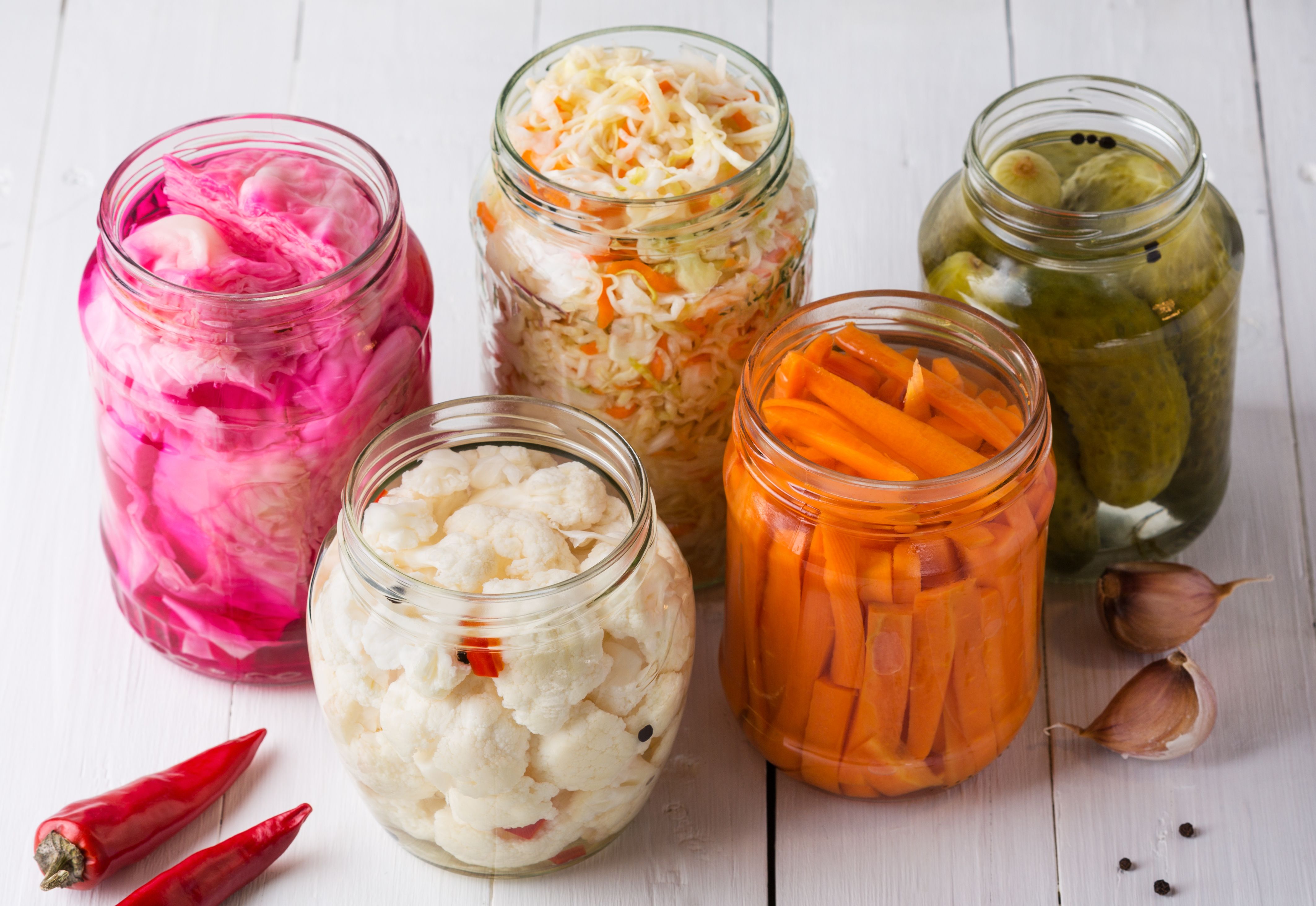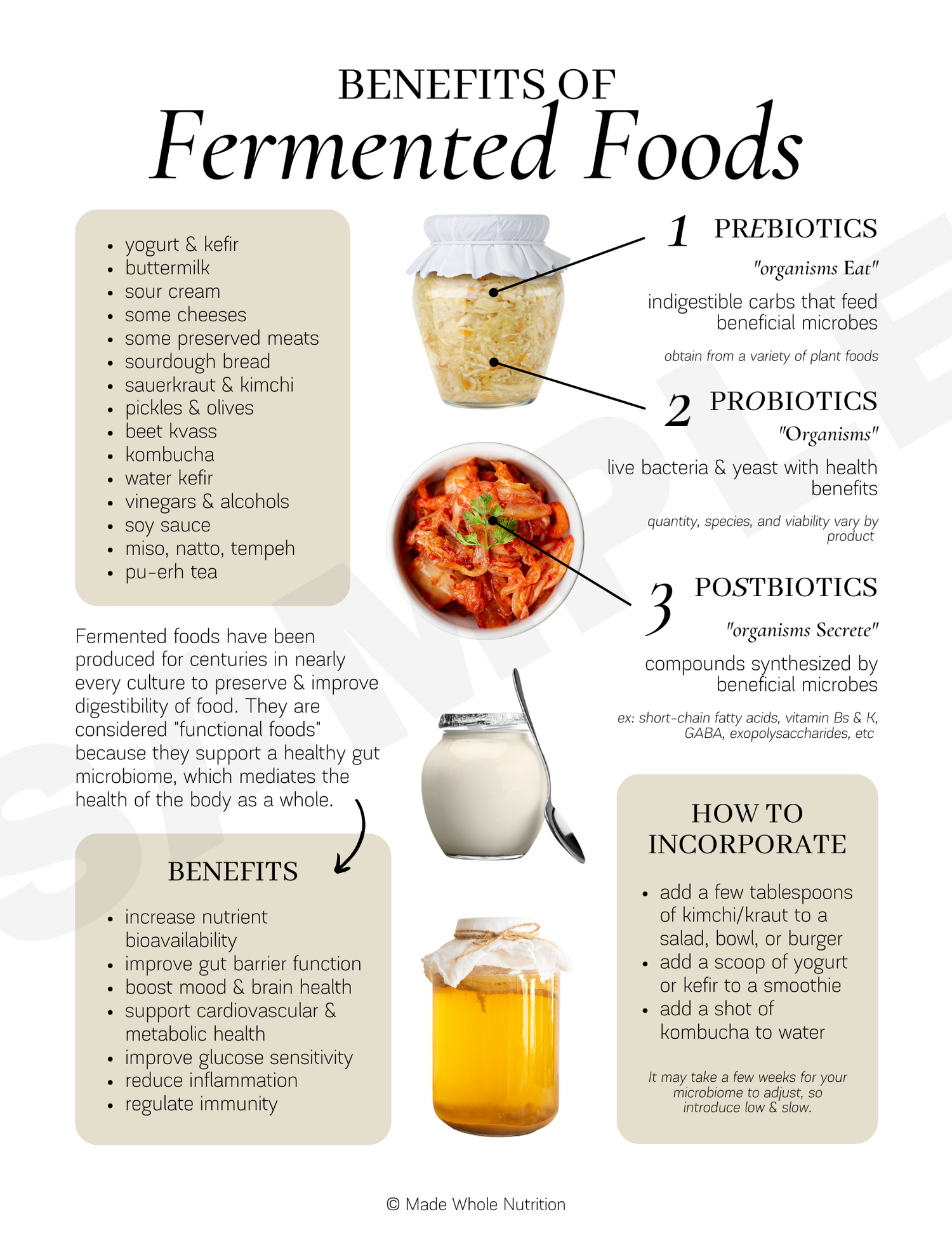Fermented Foods for Gut Health: Boost Your Wellness Naturally

Fermented foods like yogurt and kimchi boost gut health by promoting beneficial bacteria. They aid digestion and improve immunity.
Fermented foods have long been valued for their health benefits. They are rich in probiotics, which support a healthy gut microbiome. The gut is crucial for overall well-being, influencing digestion, mood, and immune function. Consuming fermented foods can help maintain a balanced gut flora, reducing issues like bloating and constipation.
Popular fermented options include sauerkraut, kefir, and miso. These foods not only enhance gut health but also offer essential nutrients and unique flavors. Incorporating them into your diet can lead to noticeable improvements in digestive health and overall vitality. Prioritize these natural probiotics for a healthier, happier gut.
Introduction To Fermented Foods
Fermented foods are made by letting good bacteria grow in them. These foods help our gut stay healthy. Some examples are yogurt, sauerkraut, and kimchi. The bacteria turn sugars into acids or alcohol. This makes the food last longer and taste unique. Fermented foods can be rich in probiotics. Probiotics are good for our digestive system.
People have been fermenting food for thousands of years. Ancient people used fermentation to preserve food. They did not have refrigerators, so this was important. Fermented foods were also part of traditional diets. Different cultures have their own fermented foods. For example, Koreans have kimchi, and Germans have sauerkraut. These foods were also believed to have health benefits.

Credit: www.dawnjacksonblatner.com
Benefits Of Fermented Foods
Fermented foods help your body break down food better. They contain good bacteria called probiotics. These bacteria aid in breaking down complex foods. This process helps in reducing bloating and gas. Your tummy will feel more comfortable.
Your body can absorb nutrients more easily with fermented foods. Probiotics help in breaking down nutrients. This process makes it easier for your body to use them. You get more vitamins and minerals from your meals. This is good for your overall health.
Popular Fermented Foods
Yogurt is made from milk. It is fermented by good bacteria. These bacteria are called probiotics. They help your gut stay healthy. Kefir is also made from milk. It has more probiotics than yogurt. Both are good for your tummy.
Sauerkraut is made from cabbage. It is crunchy and sour. Good bacteria ferment it. These bacteria help your digestion. Kimchi is also made from cabbage. It is spicy and tangy. It has garlic, ginger, and chili too. Both are tasty and healthy.

Credit: www.womenshealthmag.com
How Fermented Foods Affect The Gut
Fermented foods are rich in probiotics. These are good bacteria. They help balance the gut flora. A healthy gut flora aids digestion. It also prevents harmful bacteria from growing.
Fermented foods can boost the immune system. They increase the number of good bacteria. This helps the body fight off infections. A strong immune system is important for overall health. Fermented foods like yogurt and sauerkraut are good choices.
Incorporating Fermented Foods Into Your Diet
Start with a simple yogurt parfait. Mix yogurt with fresh fruits and nuts. This can be a delicious breakfast or snack.
Make a kimchi fried rice. Stir-fry kimchi with rice, veggies, and a bit of soy sauce. It’s quick and tasty.
Enjoy a kombucha drink. Brew tea with sugar and add a SCOBY. Let it ferment for a few days. It’s fizzy and refreshing.
Eat fermented foods daily. Include them in your main meals or as snacks. This helps your gut stay healthy.
Keep portions small at first. Your body needs time to adjust. Gradually increase the amount as you get used to it.
Try different types of fermented foods. Yogurt, kimchi, sauerkraut, and miso are great options. Variety helps you get more benefits.

Credit: madewholenutrition.com
Potential Side Effects
Fermented foods can occasionally cause bloating, gas, or digestive discomfort. Individuals with histamine intolerance might experience adverse reactions. Always introduce fermented foods gradually to monitor any potential side effects.
Common Issues
Fermented foods can cause gas and bloating. These foods may cause stomach cramps. Some people get headaches from fermented foods. Too much fermented food can lead to diarrhea. Fermented foods can be high in salt. This can raise blood pressure.
When To Seek Medical Advice
Seek help if you have severe stomach pain. Go to a doctor if you have a high fever. See a medical expert if you have blood in your stool. Ask for advice if you feel dizzy. Get help if you have trouble breathing. A doctor should be seen if symptoms last for more than a few days.
Fermented Foods For Different Diets
Fermented foods like yogurt, kimchi, and sauerkraut boost gut health by promoting beneficial bacteria. These foods fit seamlessly into various diets.
Vegan And Vegetarian Options
Vegan and vegetarian choices are rich in nutrients. Kimchi and sauerkraut are perfect. Tempeh is another excellent option. These foods boost gut health. Miso soup is also great. It is both tasty and healthy. Kombucha is a refreshing drink. It is full of probiotics. Fermented vegetables are easy to make at home. They are also very delicious. All these foods are plant-based. They are suitable for vegans and vegetarians.
Gluten-free Choices
Many fermented foods are gluten-free. Yogurt is a top choice. It is rich in probiotics. Kefir is another option. It is similar to yogurt. Kimchi and sauerkraut are also gluten-free. They are good for the gut. Pickles are tasty and safe to eat. Coconut yogurt is a dairy-free option. It is good for people with lactose intolerance. All these foods help improve digestion. They are safe for gluten-sensitive people.
Diy Fermentation At Home
Start with fresh vegetables and clean jars. Chop the vegetables into small pieces. Add salt to the vegetables to help them release water. Pack the vegetables tightly into the jar. Make sure they are submerged in their liquid. Leave some space at the top of the jar.
Cover the jar with a cloth or a lid. Keep the jar at room temperature. Check the vegetables every day. Taste them after a few days. They should taste tangy and sour. Once ready, store them in the fridge.
Use clean hands and tools to prevent contamination. Always use fresh ingredients. Avoid using vegetables with mold or rot. Make sure the vegetables are fully submerged. This prevents harmful bacteria growth.
Keep the fermentation area clean. Check the jars for signs of mold. If you see mold, discard the batch. Store fermented foods in the fridge to slow down fermentation. Always label the jars with the date.
Future Of Fermented Foods
Fermentation technology is advancing quickly. New methods make fermented foods even healthier. Scientists are exploring probiotics that can improve gut health. They are also working on prebiotics. These feed the good bacteria in our gut. New fermentation techniques can reduce sugar and salt in foods. This makes them better for our health.
Fermented foods are becoming more popular. People are looking for healthier options. Sales of kombucha, kimchi, and yogurt are rising. There is a growing interest in homemade fermented foods. This trend is driving innovation in the market. Companies are developing new products. They are also focusing on eco-friendly packaging.
Frequently Asked Questions
What Are Fermented Foods?
Fermented foods are foods that have undergone a natural process involving the conversion of carbohydrates to alcohol or organic acids using microorganisms like bacteria, yeast, or fungi.
How Do Fermented Foods Help Gut Health?
Fermented foods introduce beneficial probiotics into your digestive system, enhancing the gut microbiota. This helps improve digestion, boost immunity, and reduce inflammation.
Which Fermented Foods Are Best For Gut Health?
Some of the best fermented foods for gut health include yogurt, kefir, sauerkraut, kimchi, miso, and kombucha. These foods contain high levels of beneficial bacteria.
Are Fermented Foods Safe For Everyone?
Most people can safely consume fermented foods. However, individuals with compromised immune systems or specific health conditions should consult a healthcare provider before adding them to their diet. see more
Conclusion
Fermented foods can greatly improve gut health and overall well-being. Adding them to your diet is simple and beneficial. Enjoy the natural probiotics in yogurt, kimchi, and sauerkraut. Your digestive system will thank you for it. Embrace these tasty options and support your gut health naturally.






